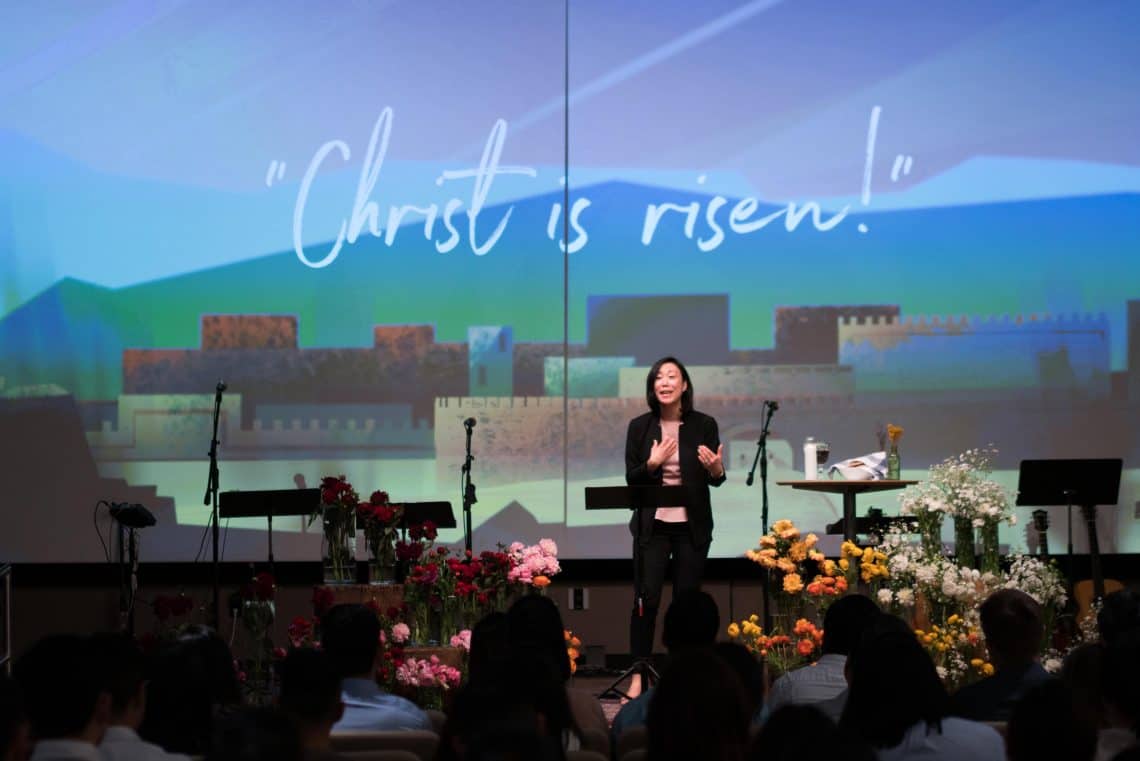This is What a Leader Looks Like is a series on women leaders in Christian contexts adapted from an interview project conducted by Naomi Hall. In 2017 Naomi served as a student intern with the Center for Transformation Leadership, a joint endeavor of the Free Methodist Church and Azusa Pacific University. Read more about her project at the end of the post.
Meet Janette Ok.
Janette is a Teaching Pastor at Ekko Church and Assistant Professor of Biblical Studies, New Testament at Azusa Pacific Seminary. She has more than 18 years of ministry experience and has studied at UCLA and Princeton Theological Seminary. She is passionate about equipping leaders for the church. Janette spends her best waking hours with her three hilarious children, Martin, Arielle, and Theodore, and best friend and husband, Ricky.
What influences came into your life to lead you to a leadership role?
In the fifth grade, I attended a camp for Korean-American youth. At the end of the camp, I received a “paper plate” award that read, “Janette is bound to become a Sae Jong camp counselor someday due to her leadership abilities.” That was the first time I saw myself a leader and, ever since, I have tried to discover what it meant to be a great one.
My formation as a scholar began as a freshman at UCLA when I discovered my love for early Christian history and the New Testament. My gift for teaching was activated when I taught my Vacation Bible School class as a high school kid. It was tested by fire when I became an English teacher at Compton High School. My formation as a pastor began the day my youth pastor taught me something that has indelibly influenced my life ever since: “leadership flows out of being, not out of doing.”

What challenges did you face to get into this leadership position?
I received quite a bit of flak from conservative male seminarians and pastors about my aspirations to become a pastor and biblical scholar. When I was a freshman in high school, I shared with a retreat speaker that I wanted to become a pastor. Surprised and troubled, he told me, “God used women like Deborah to lead his people only when he could not find faithful men to rise to the challenge.”
And when a pastor at a college campus Bible study saw my Greek textbook and asked me why I wanted to learn the language, I told him I was studying to become a biblical scholar. He told me, “Janette, remember your highest priority as a woman is to become a wife and mother.” These are just a few examples of the push-back I received while I was exploring my calling as a young woman.
However, I also received strong support and encouragement from both men and women along the way, which helped me endure the discouragement, frustration, and sexism (overt and covert) that women too often face. I’m grateful to belong to a church where women are fully affirmed as equals.
As a working mother in a pastoral leadership position I am sometimes viewed by others who meet me for the first time or who do not know me well with some suspicion: “Are you as good a leader as the other guys?” “Are you as good a mother as the stay-at-home moms?”
I also feel the pressure to perform well every time, not just some of the time. There is less grace for women leaders who make mistakes. If a male leader makes a mistake, it usually reflects just on him (though this is not the case for men of color working in predominantly white contexts). But if a woman leader makes a mistake or lets her guard down, it tends to reflect on her entire sex: “See, women can’t lead,” “women shouldn’t preach” or “women are too emotional.”
When a woman leader speaks up and asserts herself, she is often criticized for being overly aggressive, demanding, or difficult. Asian American and Pacific Islander (AAPI) women leaders have to work even harder to overcome persistent cultural stereotypes that portray them as soft-spoken, gentle, meek, submissive, and eager to please.

What does female leadership look like to you?
Strong and able women leaders are out there, and there is no single image that comes to mind. I hope and pray that when my own kids, students, and church members close their eyes and imagine what a capable and Christ-like leader looks like, they imagine women as immediately and vividly as they do men.
That said, I think an image of leader that often goes overlooked is that of mother. Mothers lead. They multitask, strategize, problem-solve, inspire, console, discipline, nurture, direct, advise, administrate, teach, collaborate, budget, and so on!
Mothers need to be given more credit for their role in shaping their families and building communities. This is why MaryKate Morse sees mothering—whether done by women or men—as an excellent image and theoretical framework for understanding the role of the pastor (Pastoring as Mothering).
What challenges do you face in your job that are unique to being a woman?
The biggest challenge I face is striking the right work-life balance. I am very privileged to be able to have a career I love and serve in a church I love while raising the kids I love. But it definitely doesn’t come easily. I want to do it all and do it well!
I want to be present with my kids and participate actively in their everyday lives. I want to be an engaged, excellent, and loving professor, pastor, scholar, wife, daughter, sister, friend, activist, and member of the community. I want to cook homemade meals and keep a clean house. I want to workout and write. But, of course, I can’t do it all.
I’m learning to be more gracious with myself. I’m learning to say no to more things that aren’t essential or life-giving. I’m learning to accept and embrace my limitations. Thankfully, I have a real partner in my husband, who shares in the joys and responsibilities of raising a family and serving the Lord.
What advice could you offer to younger women working toward leadership roles?
Seek mentors…but be generous and flexible with the term “mentor.” Be open to finding mentors in unexpected places. I haven’t personally met some of my mentors; some of them have been dead for years! I’ve met them in books.
Be a student of leaders, pastors, preachers, and teachers whom you admire and who differ from you. Listen to their talks, sermons, and lectures. Read their books. They don’t have to be your official “mentor” in order to mentor you. When you are fortunate enough to have the attention of those you want to learn from, be ready with focused questions and mindful of their time.
Be in solidarity—not competition—with other women. Support and celebrate their growth, success, and achievements. Share in one another’s struggles, challenges, and frustrations. And when you become a leader, mentor others. Sisters, we’re in this together!
Train yourself not to say “sorry” so much. Don’t apologize for having an opinion, asking questions, or wanting to learn. Avoid beginning your sentences with disqualifiers like “I may not know what I’m talking about, but…” or “I’m so nervous because I’m so bad at speaking in front of people.” Avoid concluding your sentences with “that didn’t make any sense, did it?” or “was I rambling?”
Don’t wait until you feel confident. It takes a while to find your voice and feel competent and confident at exercising your God-given gifts. But you have to use your voice in order to find it and exercise your gifts in order to edify others.
See every opportunity you have to serve as a chance to grow. Setting up chairs, giving announcements, reading Scripture, facilitating a small group, teaching Sunday school, leading worship, praying publicly, organizing an event, etc.
See these opportunities not only as a way to serve others but also as a chance to discern and practice your gifts and grow as a communicator and leader. Invite (as opposed to passively wait for) others to give you constructive, honest feedback for how you can improve.
Sit at the table. When you’re in a meeting or gathering full of men, resist the urge to occupy the corners of the room or to be as invisible as possible. Pull up a chair, sit at the table or wherever the action is at, and participate in the conversation! Leaders embody space and are sensitive to how they use their bodies, physical gestures, speech, and influence.
Make room for yourself and also for others.
Note: Janette highly recommends Making Room for Leadership: Power, Space & Influence by MaryKate Morse.
 Naomi Hall on “This is What a Leader Looks Like”. “Since research suggests that women better envision their own leadership potential when they see other women leading, the purpose of this project was to increase the visibility of women leaders in Christian contexts. We live in an image saturated society, but when you search Google for women in leadership or women in ministry not much comes up. So the project is an attempt to broaden the horizons of what women leaders looks like in our world today. And let me tell you, there are amazing women out there who deserve to be highlighted and are representative of other women in similar roles.”
Naomi Hall on “This is What a Leader Looks Like”. “Since research suggests that women better envision their own leadership potential when they see other women leading, the purpose of this project was to increase the visibility of women leaders in Christian contexts. We live in an image saturated society, but when you search Google for women in leadership or women in ministry not much comes up. So the project is an attempt to broaden the horizons of what women leaders looks like in our world today. And let me tell you, there are amazing women out there who deserve to be highlighted and are representative of other women in similar roles.”







7 responses to “This is What a Leader Looks Like: Seminary Professor Edition”
Thank you very much for this. As a woman living in a somewhat backward society, I tend to be looked down on because of my opinions. Even other women shake their head in pity when I talk about my views. Since I ask so many questions, I find myself saying ‘sorry’ quite often and would rather not be bold and voice my opinions since i already know the answers I’ll get. I want to make the women around me believe they are woRoth so much more but I don’t know how to do that. I tried reading a post from your blog to them but I got shot down and indirectly told that those views were wrong. If you have time, I wouldn’t mind some advice. Thank you. 🙂
Such a great read – thanks so much for your wisdom, courage and grace – may we all aspire to practise these more. I loved this quote ‘I hope and pray that when my own kids, students, and church members close their eyes and imagine what a capable and Christ-like leader looks like, they imagine women as immediately and vividly as they do men.’ That’s what I am especially taking away from this for myself, my children (boys) and those whom I do life and faith with.
Thank you so much, Janette! I love the thought that our mentors can be people we have mentored us via books or even online sermons. As a writer, it was also helpful to me when you said that women need to use their voice in order to find it. Very good article – thanks!:)
This series will be so helpful to me. Thank you, Janette, Naomi, and The Junia Project.
I love this interview and loved getting to know Janette. This paragraph particularly resonated with me: That said, I think an image of leader that often goes overlooked is that of mother. Mothers lead. They multitask, strategize, problem-solve, inspire, console, discipline, nurture, direct, advise, administrate, teach, collaborate, budget, and so on!
Mothers need to be given more credit for their role in shaping their families and building communities. This is why MaryKate Morse sees mothering—whether done by women or men—as an excellent image and theoretical framework for understanding the role of the pastor (Pastoring as Mothering).
And I love her advice. This is a lot of love and to think I nearly skipped this. I’m sharing!!!